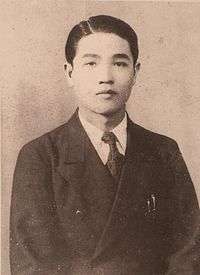Chung Li-ho

Zhong Lihe (Chinese: 鍾理和, otherwise spelled as Chung Li-ho, also known as Chûng Lî-fò or Tsûng Li-fô when transliterated from Hakka); November 6, 1915 – August 4, 1960, was a Taiwanese novelist. He was a Liudui Hakka (Chinese: 六堆客家人), born in Gaoshu Township, Pingtung in 1915, who migrated to Meinong (nearby and also part of the same sub-division of the Liudui 六堆, the Youdui (Chinese: 右堆 右堆; now Meinong District, Kaohsiung City) in around 1932. Eloping with a woman because their same-surname relationship was taboo in their community,[1] he resided in Shenyang and Beijing on the Chinese mainland - but, like Taiwan, under Japanese rule at the time - between 1938 and 1946. He died of pulmonary tuberculosis at the age of 44[2] in Meinong whilst revising his last and possibly finest work, a novella entitled "Rain" Chinese: 雨.
Legacy
There is a Zhong Lihe Memorial Institute (Chinese: 鍾理和紀念館 dedicated to Zhong located in Meinong, Kaohsiung. His life has been dramatized as China, My Native Land (Chinese: 原鄉人; literally: The man from the native land), a 1980 film directed by Li Hsing; of which the eponymous theme song was sung by Teresa Teng. Zhong's eldest son Zhong Tiemin (otherwise spelled as Chung Tieh-min) (Chinese: 鍾鐵民), 1941-2011, was an award-winning writer of fiction and prose.
See also
References
- ↑ Han Chueng (31 July 2016). "Taiwan in Time: Fleeing to the old country for love". Taipei Times. Retrieved 1 August 2016.
- ↑ Mu Qian (April 14, 2011). "Ode to a writer". China Daily.
T. M. McClellan, “Home and the Land: the “native” fiction of Zhong Lihe”, Journal of Modern Literature in Chinese, 9.2 (December 2009): 154-182. Zhong Lihe, From the Old Country: stories and sketches of China and Taiwan, Edited and translated by T. M. McClellan, Columbia University Press, 2014.
External links

- Digital museum of Chung Li-ho - a website and database built by the Taiwan government (in Chinese)